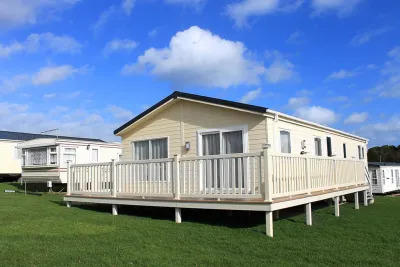Mobile homes are designed to be movable and are often located in mobile home parks or private lots. They require access to basic utilities, including water and electricity, to function as comfortable living spaces. Let’s delve into the details of how these essential services are provided to mobile homes.
Water Supply for Mobile Homes
Connection to a Municipal Water System
Many mobile homes are connected to a municipal water system, similar to traditional homes. These systems supply water through underground pipes, which are connected to a water meter near the mobile home. The water meter records the amount of water used, allowing residents to be billed accordingly.
To establish a connection to the municipal water system, a mobile homeowner typically needs to contact the local water utility and request a connection. The utility company will install a water meter and connect the mobile home to the main water line. This setup ensures a consistent and reliable water supply, similar to that of a traditional home.
Well Water System
In some cases, mobile homes may be located in rural areas where access to a municipal water system is limited. In such situations, mobile homes can utilize a well water system. A well is drilled into the ground, reaching the water table, and a pump is installed to bring the water up to the surface.
A water well system requires regular maintenance, including periodic testing for water quality and pump inspections. Mobile home owners must ensure the well is properly maintained to guarantee a safe and clean water supply.
Electricity Supply for Mobile Homes
Connection to the Grid
Most mobile homes are connected to the local power grid, allowing residents to access electricity in a similar way to traditional homes. The mobile home is typically connected to the grid through an electrical pedestal or meter base located outside the home.
To establish an electricity connection, the mobile home owner needs to contact the local electric utility company. The utility company will install a meter base and connect the mobile home’s electrical system to the power grid. Once connected, the mobile home can receive electricity for various appliances and lighting.
Off-Grid Systems
In some cases, mobile homes may be located in remote areas without access to the power grid. In these situations, off-grid systems, such as solar panels or generators, can be used to provide electricity.
Solar panels can be installed on the roof of a mobile home to capture sunlight and convert it into electrical energy. This energy can be stored in batteries or used directly to power appliances and lighting. Generators, powered by fuels like gasoline or propane, can also be used to generate electricity for off-grid mobile homes.
Differences Between Mobile Homes and Traditional Homes
While mobile homes can have similar water and electricity systems as traditional homes, there are a few key differences to consider. Mobile homes often require specific fixtures and fittings designed for their unique structures. Additionally, the plumbing and electrical systems in mobile homes are typically more compact and require specialized installation and maintenance.
It’s important for mobile home owners to be aware of these differences and consult professionals familiar with mobile home systems when performing repairs or upgrades to ensure compliance with safety standards.
Maintenance and Safety Considerations
Maintaining the water and electricity systems in a mobile home is crucial for safety and functionality. Regular inspections, leak checks, and professional servicing of appliances and systems are necessary to prevent issues and ensure everything is in proper working order. Mobile home owners should also familiarize themselves with emergency shut-off procedures for water and electricity in case of accidents or maintenance requirements.
Energy Efficiency in Mobile Homes
Improving energy efficiency in mobile homes can help reduce utility costs and minimize environmental impact. Here are a few tips to enhance energy efficiency:
- Insulate the walls, roof, and floor to reduce heat transfer.
- Install energy-efficient appliances and lighting fixtures.
- Seal air leaks around windows, doors, and vents.
- Use window coverings to control heat gain and loss.
- Consider renewable energy options like solar panels.
By implementing these measures, mobile homeowners can create a more sustainable and cost-effective living environment.
Conclusion
Understanding how mobile homes receive water and electricity is essential for both current and prospective mobile home owners. Whether connected to a municipal system or utilizing well water, mobile homes have reliable access to clean water. Similarly, being connected to the power grid or using off-grid systems ensures a steady supply of electricity. By considering maintenance, safety, and energy efficiency, mobile home owners can enjoy comfortable living in their mobile residences.




